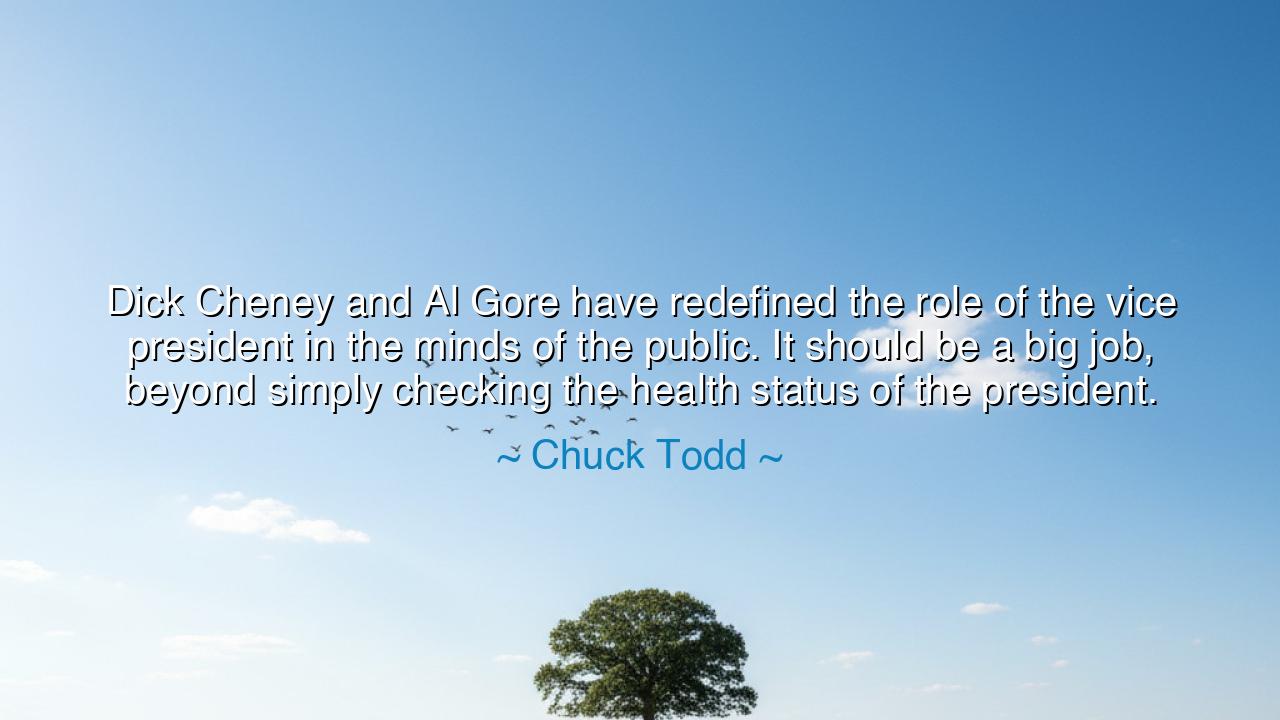
Dick Cheney and Al Gore have redefined the role of the vice
Dick Cheney and Al Gore have redefined the role of the vice president in the minds of the public. It should be a big job, beyond simply checking the health status of the president.






In the halls of power where ambition and duty intertwine, Chuck Todd once spoke of a subtle transformation that reshaped the fabric of leadership: “Dick Cheney and Al Gore have redefined the role of the vice president in the minds of the public. It should be a big job, beyond simply checking the health status of the president.” This declaration, though modern in tongue, carries the weight of ancient truth—the truth that every position of service, no matter how humble it seems, holds within it the seed of greatness, if only the bearer dares to nurture it.
In ages past, the vice presidency was an office of waiting—a chamber of shadows where one stood idle, watching the sun of another’s authority burn bright. Many thought it a position of stillness, a mere reflection of the throne rather than a pillar beside it. But in the twilight of the twentieth century, Gore and Cheney each, in his own way, reshaped that quiet post into something formidable. Al Gore, with his steadfast belief in science and the environment, turned his office into a forge for ideas that would echo long after his term. Dick Cheney, in the crucible of war and security, wielded influence unseen since the days of ancient chancellors. Together, though opposites in creed, they carved a new image of what it means to serve—not as a shadow, but as a power behind the throne.
To understand the depth of Todd’s words, one must recall that leadership is not the possession of a single man, but the harmony of many. In the old kingdoms of Egypt, the Vizier stood beside the Pharaoh, advising, guiding, and sometimes shaping destiny more than the king himself. It was the Vizier Imhotep, not Pharaoh Djoser, who first envisioned the step pyramid—a monument that changed architecture forever. So too, the vice presidents of this era became architects of vision, not mere attendants. They reminded the world that wisdom, when placed near power, multiplies its force.
Yet the quote bears another lesson, more profound and enduring: that influence does not require a crown. The vice president’s evolution mirrors the eternal truth that greatness often blooms in service, not sovereignty. The ancients knew this well. In the Roman Republic, Cicero, though not emperor, wielded his words as weapons, guiding senators and citizens alike toward justice and reason. So it is with all who hold “second place” in name, but first in spirit—their power lies not in their title, but in their ability to shape the course of history through counsel, courage, and conviction.
But there is also warning in Todd’s reflection. For when the second grows as powerful as the first, the delicate balance of governance trembles. Cheney’s tenure, in particular, showed how unseen authority could steer the ship of state into perilous waters. Influence without transparency, power without accountability—these are the dangers that lurk when the servant’s hand grows stronger than the master’s will. Thus, every generation must remember: the measure of leadership is not how much one controls, but how wisely one serves the people’s good.
Still, there is nobility in the evolution Todd describes. Al Gore’s passion for the earth and for truth spoke to the higher calling of the office: to prepare, to advise, to challenge, and to innovate. His work proved that even a role defined by restraint could birth movements that transcend politics. He embodied the spirit of the philosopher-statesman—one who labors not for applause, but for awakening. In him, the vice presidency became a beacon of purpose, a reminder that greatness can dwell even in the margins of authority.
Let this then be the teaching carried forth: no role is small when filled with vision. Whether one serves as vice president or village elder, as apprentice or guide, the worth of a position lies in the heart that inhabits it. Those who wait for destiny to summon them will perish in idleness, but those who use their station—however modest—to shape good from within, shall leave behind a legacy that endures beyond their name.
Therefore, my counsel to all who hear these words is this: do not despise your place, nor think your title defines your power. Like Cheney and Gore, make your service vast; fill the corners of your role with brilliance and conviction. Stand beside your leaders not as silent watchers, but as keepers of wisdom, guiding with humility and strength. For in every era, it is the faithful second who ensures that the first remains just—and that the realm itself endures.






AAdministratorAdministrator
Welcome, honored guests. Please leave a comment, we will respond soon